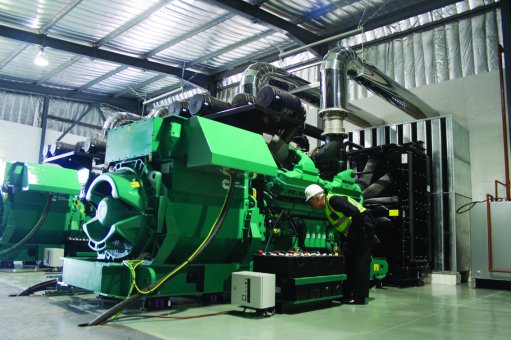
GENERATION GENERATORS
About 50% of energy used in South Africa is derived from hydrocarbon-based liquid fuels
Photo by: Duane Daws
Consulting engineering firm Raventech, in collaboration with educational institution North-West University (NWU) has initiated a research and development (R&D) project, which started in January to investigate hydrocarbon-based fuel management, quality and enhancement for diesel engines and generators.
Raventech owner Jan van Ravenswaay explains: “The focus of the project is on improving the energy efficiency of diesel fuel systems predominantly used in transport, power generation, shipping, agriculture and mining.”
The project evaluates the economic impact of the use of combustion enhancers and alternative solutions on an engine’s operational cost and to support further R&D.
The project is funded by the Department of Trade and Industry, through the Technology and Human Research for Industry Programme. The research is conducted under the leadership of NWU’s School of Mechanical and Nuclear Engineering Professor Chris Storm.
He says that, although energy in South Africa is synonymous with electricity, about 50% of energy used in South Africa is derived from hydrocarbon-based liquid fuels.
From 2005 to 2014, the pump price for one litre of diesel rose from about R5.05 to about R13.00. “Currently, there is an opportunity to develop and implement efficiency projects on petrol and diesel (hydrocarbon-based fuel) systems,” adds Storm.
Combustion enhancers are added to the hydrocarbon-based fuel to decrease fuel consumption and harmful emissions, improving system power output and extending the system life and service intervals of the system.
“To ensure repeatability and the scientific integrity of the tests, facilities ranging from 100 kW to 500 kW are being established at NWU within the next two to three years to perform the research in a controlled environment,” he highlights.
“Raventech has conducted multiple experiments where combustion enhancers were used in operating hydrocarbon-based fuel systems,” says Van Ravenswaay, adding that the initital results of the experiments were positive. These experiments now have to be repeated according to standardised protocols under controlled conditions. “
The research should lead to the development of theoretical models that Raventech can use when designing tailored solutions for clients, based on a combination of combustion enhancers, filters and monitoring and control equipment, to improve the energy efficiency of hydrocarbon-based fuel systems,” he concludes.